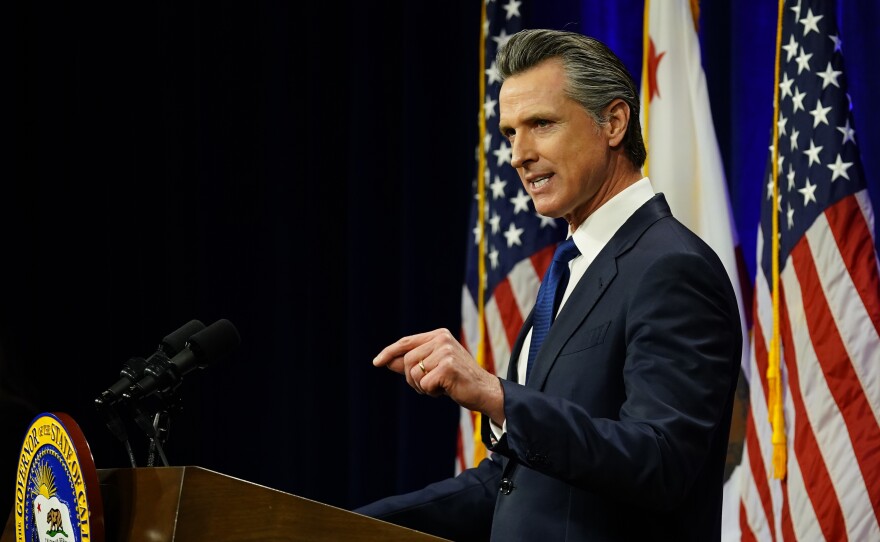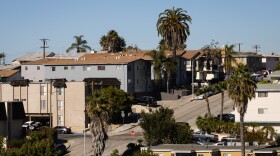California Gov. Gavin Newsom has contacted all sides of the strikes that have hobbled Hollywood, his office said Wednesday, offering to help broker a deal to restart an industry that is crucial to keeping the state's economy humming amid signs of weakness.
So far, neither studio executives nor actors and writers have shown formal interest in bringing Newsom to the negotiating table, said Anthony York, Newsom's senior adviser for communications. But York said both Newsom and senior members of his administration have been in touch with all sides as the two strikes stretch deeper into the summer blockbuster season.
“It’s clear that the sides are still far apart, but he is deeply concerned about the impact a prolonged strike can have on the regional and state economy,” York said. He further noted “thousands of jobs depend directly or indirectly on Hollywood getting back to work,” including crew, staff and catering.
The last time the writers went on strike more than a decade ago, the 100-day work stoppage cost the state’s economy an estimated $2 billion. The economic hit could be even bigger this time around now that actors have joined the picket lines. The strikes come after Newsom signed a state budget that included a more than $31 billion deficit in part because of a slowdown in the tech sector, another one of the state's key industries.
The writers have been on strike since May, and the actors joined them earlier this month. Both unions have concerns about how they will be paid in an age where fewer people are paying to go to the movies or watch cable TV in favor of streaming services. And they are worried how the rise of artificial intelligence will affect the creative process of how movies and TV shows are made and who is paid to make them.
The Democratic governor first offered to help mediate a deal in May, shortly after the writers strike began, saying he was sympathetic to their concerns about streaming and artificial intelligence.
Now in his final term in office, Newsom has worked hard to boost his national profile as he sets his sights on life after the governor's office. He is widely considered a future presidential contender, though he has said he has no plans to run. Any role for Newsom to help end strikes halting one of the country’s most recognizable industries could bolster his status on the national stage.
Labor actions have lit up California this summer, and it has become common for politicians and their allies to step in to broker deals. New Los Angeles Mayor Karen Bass, for example, helped negotiate an end to a strike by Los Angeles school staff. Acting Biden administration Labor Secretary Julie Su, a former California labor leader, helped reach an end to a contract dispute at Southern California ports.
Asked about Newsom’s involvement, Bass spokesman Zach Seidl said in a statement that “this is a historic inflection point for our city. ... We continue to engage with labor leaders, studio heads, elected leaders and other impacted parties to arrive at a fair and equitable solution.”
York declined to say who Newsom has spoken with, either on the unions' side or the studios. Representatives for the Screen Actors Guild – American Federation of Television and Radio Artists and the Alliance of Motion Picture and Television Producers declined to comment.
Hollywood isn't just a major economic driver in California — it's also a fundraising powerhouse for mostly Democratic candidates, including Newsom. In 2021, when Newsom was facing a recall election that could have removed him from office, Netflix co-founder Reed Hastings donated $3 million to help defeat it. He has received smaller contributions from executives at Disney, Sony and Lionsgate. Prominent directors and producers like Stephen Spielberg and Chuck Lorre have also donated to his campaigns.
Newsom’s relationships with some of Hollywood’s most powerful executives could potentially help him in any negotiations over the strikes as he continues to advocate for the causes of the workers. Newsom also has a connection to Hollywood through his wife, Jennifer Siebel Newsom, who used to be an actor and is now a documentary director.
Also this year, Newsom signed a law to extend tax credits for movie and television productions. The big change is that those tax credits will be refundable, meaning if a movie studio has credits that are worth more than what it owes in taxes, the state will pay the studio the difference in cash.








